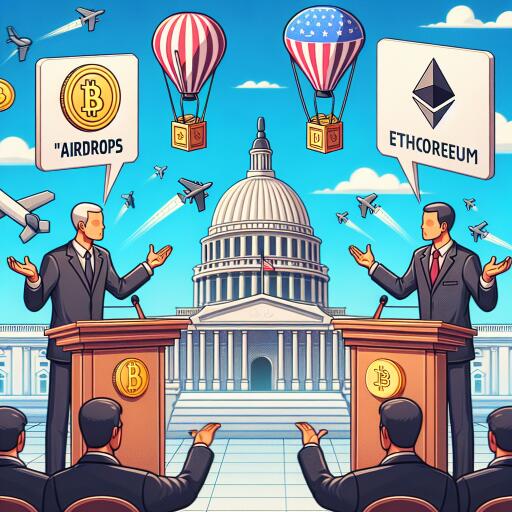Congressmen Challenge SEC’s Stance on Airdrops as Securities in Blockchain Sphere
In a vibrant critique of the Securities and Exchange Commission’s (SEC) regulatory stance, Congressmen Tom Emmer and Patrick McHenry are taking a stand against the classification of digital asset airdrops as securities. Their contention centers on a recent move by SEC Chair Gary Gensler that has sparked a wave of concern among blockchain enthusiasts and developers alike.
Airdrops, the process whereby tokens are freely distributed to the early adopters of a blockchain network, have been a fundamental component in fostering the growth and development of decentralized platforms. However, the SEC’s current position, viewing these airdrops as potential securities, is seen as a roadblock to innovation within the sprawling U.S. blockchain ecosystem.
The congressmen’s concerns are articulated in a detailed letter directed to Chair Gensler, demanding clarification and a rethink of the SEC’s policies. “By marking airdrops with the securities label, the SEC is not only misinterpreting the essence of these digital assets but also imposing unnecessary hurdles that dampen technological progress,” the lawmakers stressed. They underscore the incongruity in the SEC’s logic, especially given its previous acknowledgments that digital assets, in their native form, do not constitute securities.
Central to their argument is the application of the Howey Test—a legal standard used to determine if a transaction qualifies as an investment contract (and therefore a security). The SEC’s reasoning that airdrops might fulfill the “investment of money” criterion of this test is what Emmer and McHenry are particularly challenging. They find it paradoxical that the SEC would consider free distribution of tokens as triggering securities regulation.
The letter probes further, seeking clarity on how the SEC differentiates airdrops from other rewards programs, like credit card points or airline miles, which are similarly offered for free but not classified as securities. This differentiation, or lack thereof, could significantly impact how blockchain networks function and grow, especially in terms of decentralization and governance.
“The SEC’s stance compromises the path to decentralization, forcing developers to either navigate a regulatory minefield or exclude American participants from the airdrop process,” the congressmen noted. Such exclusivity not only stifles U.S. innovation but also sidelines American users from participating in pivotal advancements in blockchain technology. With developers increasingly hesitant to include U.S.-based users in airdrops, the fear is that this could precipitate a brain drain, driving blockchain innovation offshore.
Furthermore, Emmer and McHenry argue that in a fully decentralized network, tokens derive their value from their use or utility within the ecosystem—more characteristic of commodities than securities. They advocate for a reevaluation of how such tokens are regulated, suggesting that fully decentralized network tokens should perhaps be treated as commercial transactions rather than subjected to rigorous securities oversight.
The implications of the SEC’s current regulatory approach extend beyond the blockchain sector, potentially affecting market dynamics, economic development, and tax revenue generation. Hence, the congressmen are pressing for comprehensive answers from the SEC, including any economic analyses it might have conducted, to gauge the broader impact of classifying airdrops as securities. They expect a detailed response from Chair Gensler by the end of September, signaling a crucial juncture in the ongoing dialogue between blockchain advocates and regulatory authorities.
This development adds another layer to the challenges facing Chair Gensler, who has faced scrutiny not only from the blockchain community but also from political figures and in legal arenas. As the debate over the classification of digital assets continues to unfold, the blockchain industry watches closely, hopeful for a regulatory framework that facilitates innovation rather than hindering it.










